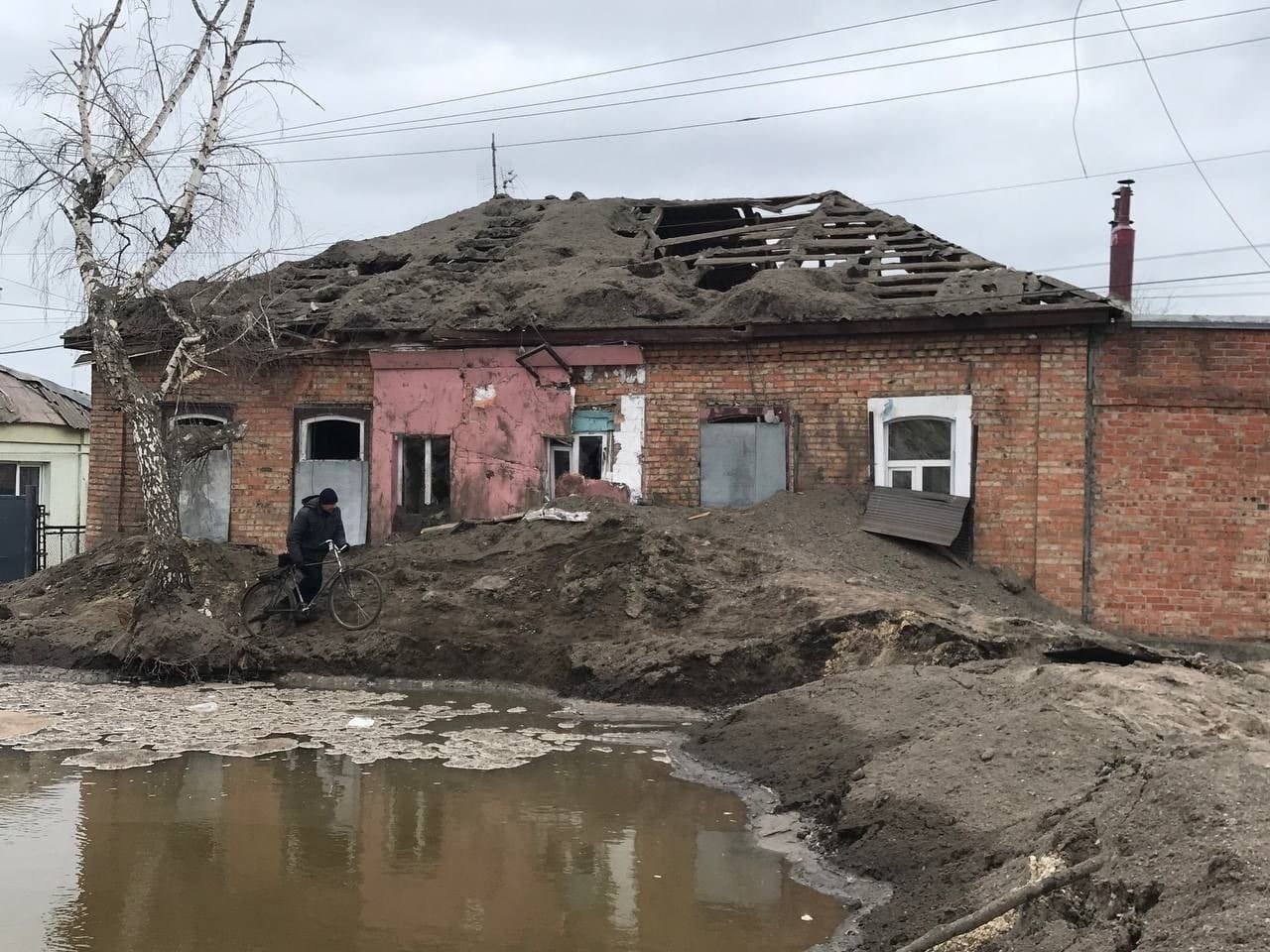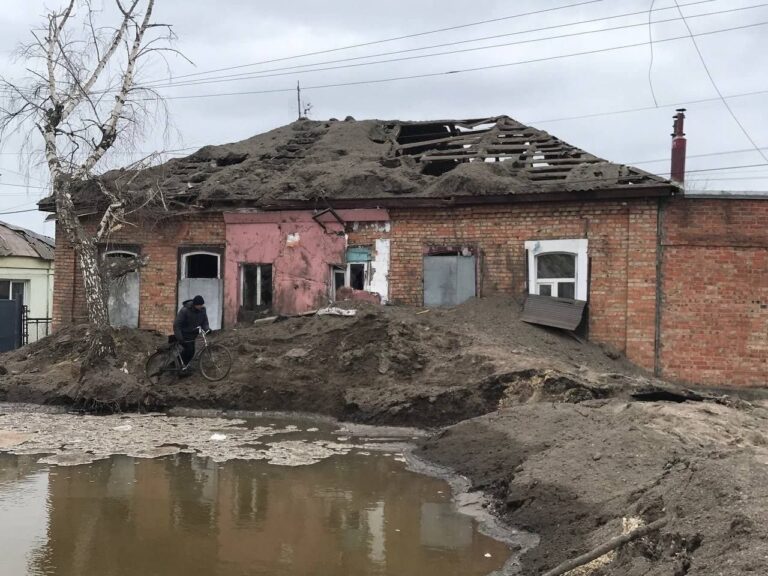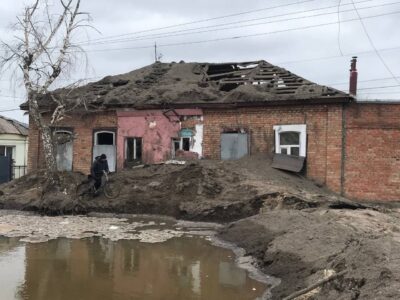I’m making breakfast when the phone rings. Yulia’s voice comes over the receiver: Dad, did you know that the war has started?
by Anastasiia Morozova, Konrad Szczygieł, FRONTSTORY.PL
Sumy, a city of 260,000 people north of Kharkiv and far east of Kyiv. Thirteen-year-old Aleksandra lives with her father and mother, Oksana, in a house in the suburbs. Alexandra’s grandfather, 78-year-old Ivan, lives in a post-Soviet block of flats in the city centre, her grandmother, Nina, in a village near Sumy. What does their daily life at war look like? Here is the diary of the family of our journalist, Anastasiia. Her loved ones have stayed in this border city, where some of the heaviest fighting between Russia and Ukraine is taking place.
Day 1: Thursday
Ivan: I get up early in the morning, as I do every day, at 5. I hear the bang of an impact. I think, “What could it be? It sounds like an explosion.” It’s hard to recognize what it is. I almost completely lost my eyesight when I was 16. I do breathing exercises; it helps when my blood pressure jumps. My caregiver calls and says: “I don’t know whether to come to you or not, those rumblings…” It was like war.
Around 7:30, Yulia, my daughter, calls from Kiev. She is frightened and nervous; she never calls this early. The call cuts off, and I hear more thumps. I put the phone down, trying to calm myself. I’m preparing breakfast when the phone rings again. Over the receiver comes Yulia’s voice: “Dad, did you know that the war has started?”
Aleksandra: We are at home. No one is coming out. It’s quiet. We don’t hear the sounds of war yet. We eat breakfast and don’t move from where we are. We don’t go upstairs, unless we go to the toilet. We try to distract ourselves from the war by watching TV, but there is only news of the war on TV.
Nina: When the alarm is sounded, I hide in the bathroom. Sirens warn us that troops are approaching.
Oksana: At 7 a.m. Sasha got a call from a friend that Russian troops were attacking Melitopol. She started crying. I said: “Don’t be upset, your friend is alive, and we will stay at home and stay alive, too”.
Day 2: Friday
Aleksandra: We dragged a blanket and pillows into the bathroom on the first floor. We hide in the bathroom and take turns sleeping.
Nina: Tanks from Russia came to our village, but not on the highway, only on local roads. Near my house they got lost, and the whole column started to turn back. People are hiding in cellars. Food is easier to come by than in the city. Those who have cows milk them and give the milk away for free; the collectors don’t collect it because they are closed. It’s the same with eggs.
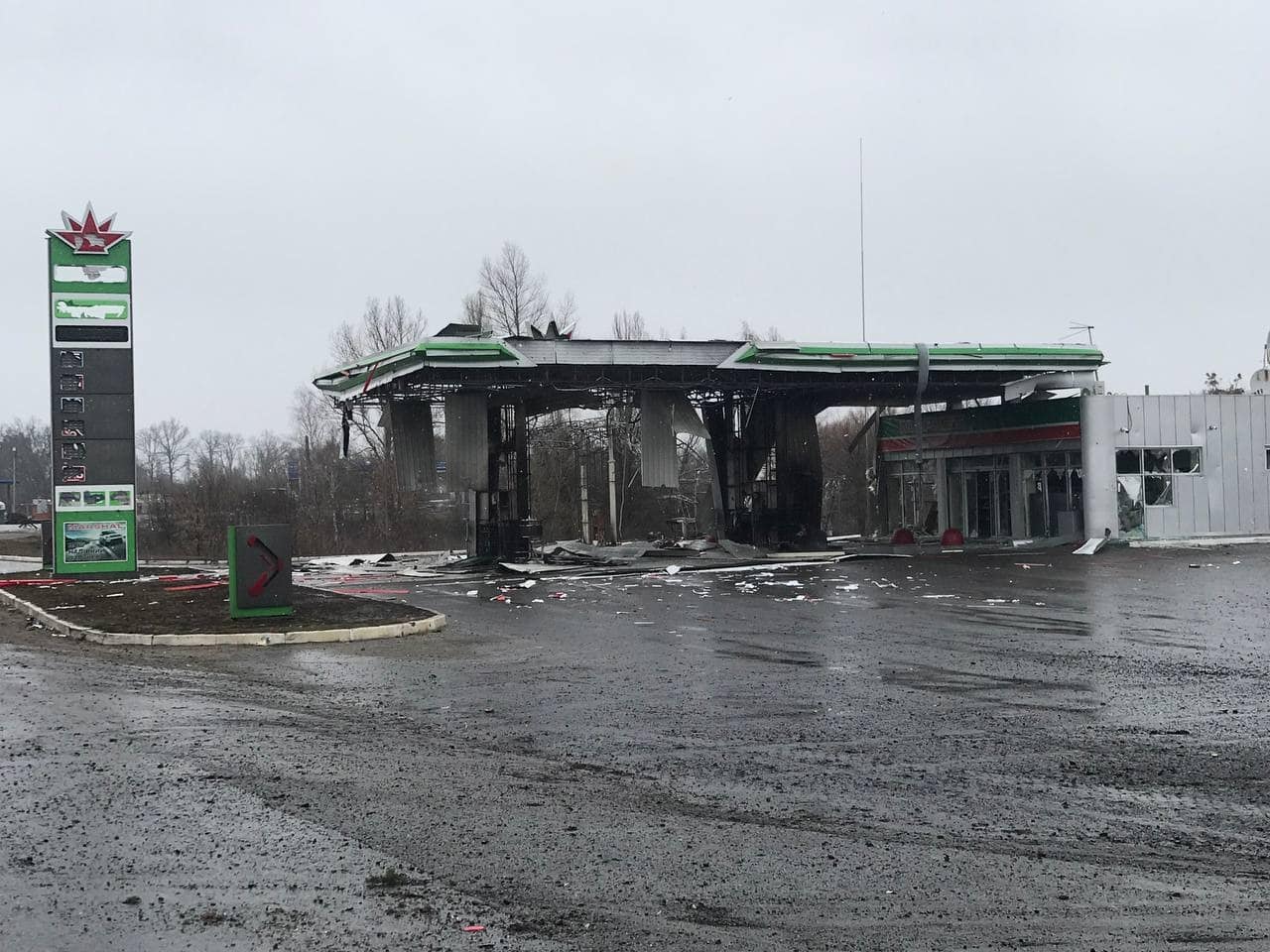
Sumy, Ukraine after Russian military attack. Source: Military Administration of the Sumy Region
Ivan: I don’t eat anything all day. I breathe in and out, trying to calm down. I only have three hypertension pills left. I’ve been to six pharmacies downtown; they’re all closed. Today I heard shelling, I heard a powerful shot, I heard bullets flying across the sky. Then I found out it was Grad rockets. We are still holding out.
Day 3: Saturday
Ivan: I sleep well when it is quiet in the morning. When I get up, there are usually no lights on outside. I guess the local government turns them off so you can’t see where civilians’ houses are. I look out the window – the whole neighbourhood is dark.
I try not to change my morning habits. I start every day with breathing exercises. Also, every day my sister-in-law calls me and asks how my night went. Today, a friend called me and said that if Putin comes here, he would rather shoot himself than live under Russian rule.
Nina: I went to the store – there is no bread anywhere. I talked to a friend whose daughter works in a bakery. She said that the flour is running out and she might not have enough until Monday. All the vegetables have been sold. No fruit, no groats, no dairy, no pasta, no canned goods. All that’s left is the most expensive fish that no one can afford: salmon and trout. Prices went up immediately. Eggs used to cost 30 hryvnia; now they cost 40. Oil used to cost 46 hryvnias; now it costs 70. Yesterday, instead of bread, I bought cakes, but they ran out, so I fried pancakes and ate borscht with them. I have a week’s supply of food. Thank God I prepared a lot of canned food in the summer: compotes, pickles, tomatoes.
Aleksandra: Another day when we hear shots and explosions. We try to fall asleep when it seems that the shooting is over. But we can’t. Falling asleep is dangerous, and we don’t feel like sleeping.
Oksana: We walked around the city today. We deliberately stayed away from the main streets. First, it was safer that way, and second, we didn’t want to see the ruined city. As we walked, we saw pools of blood and feathers. People in the city who had gotten live chickens for free were butchering them in the streets because the stores had run out of meat.
Day 4: Sunday
Ivan: I have some heart pills left. I looked for medicines in the pharmacies in the city centre, but they are all closed. The ones I have will be gone soon. I usually take half a pill a day, but since the war started I’ve already taken six.
I listen to the news on the radio. I can’t tear myself away from it. I call my friends, ask where the army columns are coming from. We discuss the information from the front, exchange news.
When there is an alarm, my daughter-in-law calls me because even though I live in the centre of the city I cannot hear the sirens. I have supplies from last week. I bought two loaves of bread, one of which I froze. I also bought some fish, which I also put in the freezer. I have enough cooked food for Thursday and Friday. There is borscht, corn groats, buckwheat groats; I have ready-made liver and chicken meat in the freezer.
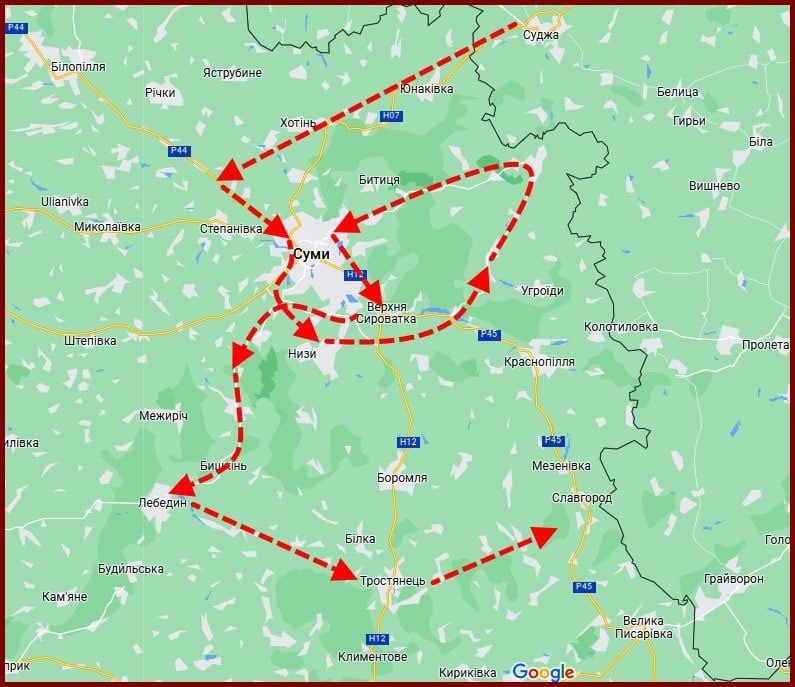
Russian troop movements near the city of Sumy, Ukraine.
Oksana: We hardly hear explosions, but that’s probably because we have airtight windows. But yesterday, for example, a friend called me and said: “Not far from you at the airport there are battles going on. Can you hear them?” I couldn’t. Only when I opened the window did I realize that battles were going on very close by.
Day 5: Monday
Ivan: Today I didn’t hear the sirens, but I don’t know if it’s because I have poor hearing or because they didn’t go off. Because I listened to a report on the radio today by a journalist from Sumy, and she said that a column was entering the town. I heard only two shots fired and thought to myself that the column must have been neutralized quickly.
Nina: Russian soldiers walk or drive around the villages. They enter stores, offer Russian money, but of course no one sells them anything. At the gas station they ask for gasoline, but there is no gasoline. I know that in other villages they go from house to house and demand food. They go into stores, take vodka, take food, and don’t pay, but threaten people with their rifles. Are we able to resist this? Well, try to say a word and they will kill you.
I heard on the news today that 75 percent of what Putin has prepared for Ukraine is already gone, that they are exhausted. Meanwhile, I decided that I would donate to the military the thousand hryvnias I got for getting vaccinated against COVID. I heard on TV that Ukrainians have already donated over 1.5 billion hryvnias.
Oksana: Yesterday my husband and I went out to the pharmacy, and Sasha was left alone at home, and just at that moment something exploded, and military equipment was passing through the city. I don’t know where Sasha was at the time, but she called crying: “Where are you? Where are you? I am calling for the third time. They are shooting at us!”
Day 6: Tuesday.
Ivan: Today I feel fear. It’s struck me that I’ve been afraid in the same way before. It was when I was a child, right after the war. Mom asked me to look in the unplowed fields for potatoes that had overwintered. We made pancakes out of them. A neighbour knocked on my window and asked me to share the food. I gave him half of what we had. When my mother found out about it, she started screaming: “Why are you giving it away? We don’t have anything to eat ourselves!”
For the first few days I was very worried that prices were going up. I had already begun to imagine, before the war broke out, that some new leaders would come in, start making their own rules, ruling us, dictating the rules. And that bothered me more than the hunger. That feeling is gone now. I listen to the radio and hear about our victories.
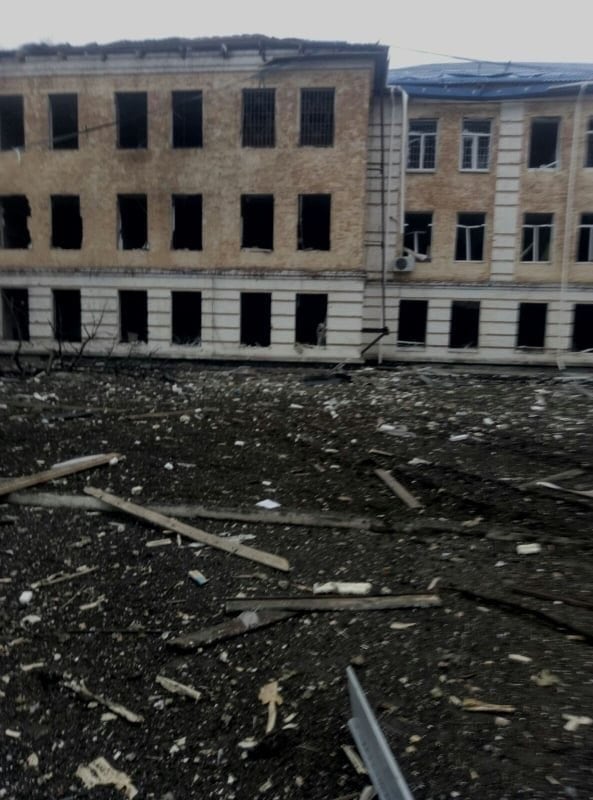
Sumy, Ukraine after Russian military attack. Source: Military Administration of the Sumy Region
Nina: I just came back from the store. I bought herrings and apples. There’s a lot of bread in the store again. They bring it from Sumy. They say they managed to deliver flour. I bought a loaf. The local poultry farm is giving away trays of eggs (1 tray is 30 eggs) and live chickens for free.
Oksana: For the first two days, I took some sedatives. When the school nearby was on fire, my hands were shaking. For the first four days we tried to take turns sleeping. I often woke up. Then my husband would go to bed, and I would go listen to the news and check the frontline information on the internet. It wasn’t until tonight that we went to bed together, at the same time. So tired that we both fell asleep.
Report from the Polish-Ukrainian border
Crowds of refugees have been gathering at border crossings since Thursday. As the Ukrainians standing in queues say, they don’t count their length in kilometres but in the number of days they have to wait before they can get to Poland.
Daria is already standing here for the fifth day – with a few more ahead of her. She is in a car with friends. The border crossing is not yet visible on the horizon. The situation at the border is difficult; most of the refugees are women with children, Daria tells us. The queue in which she is waiting was 40 kilometres long at the beginning. “We are now 3 kilometres from the checkpoint. Now the cars are going faster than yesterday, so I hope we will cross the border soon,” she says with hope in her voice. She ended up crossing the border the same day we talked.
Daria fled her home in Odessa, travelling by train to Lviv, where she then took a minibus towards the border. After spending some time on foot, her friends with a car picked her up. “One of the first bombs fell right next to my house in Odessa. I heard the explosion at 5:14 a.m.,” she says. “On my way to Poland I met Oksana. She is four months pregnant. She is going to her husband, who works in Poland. She was afraid to stay in Ukraine,” adds Daria.
Ukrainians waiting in the queue are overwhelmed by what they learn from Telegram channels, their main source of information. “People in the queue just sit in their cars and read the news. They are very sad,” she explains.
Volunteers from Poland and Ukraine distribute water and food to those waiting in line. There are two children in the car with Daria. “I am not bored with the children, and I do not have time to cry and worry about what is happening in Ukraine. For them, this is the first such long journey, the first time they have seen so many people. We play with toys and read books,” says Daria.
According to the Polish Border Guard, 98,000 people entered Poland on Tuesday. Since the beginning of the war, over 453,000 refugees from Ukraine have crossed the Polish border.
Cars are lining up on the Polish side of the border, too. Some seek to get into Ukraine. Others are waiting for their loved ones crossing the border on foot. There are also Poles offering free transport – to Krakow, Warsaw, Wroclaw. They are standing along the road or near the crossing, holding pieces of paper with the names of their loved ones written on them or the names of cities to which they can take those in need of transport.
In Medyka-Szegin, the largest and busiest border crossing, volunteers have also gathered with hot meals, medical aid, clothing and even plush toys. “Two days ago when I was in Ukraine, there were almost a quarter of a million people in line on that side. Now those queues are getting shorter,” Michal Dworczyk, head of the Prime Minister’s Office, told RMF radio yesterday. He said that after the Ministry of the Interior, the prime minister, and the president intervened, Ukrainian border guards simplified border procedures. “Women and children are being let through virtually unchecked,” Dworczyk adds.
This article was originally published in Polish on FRONTSTORY.PL.
Polish investigative outlet created by Reporters' Foundation.

